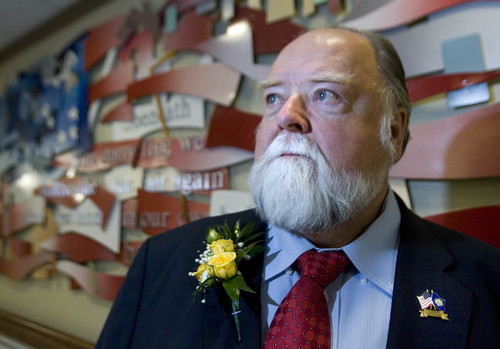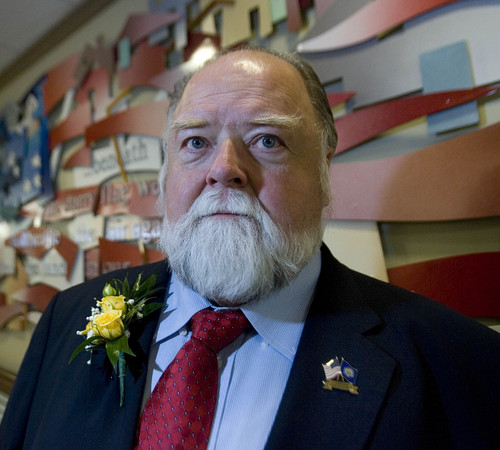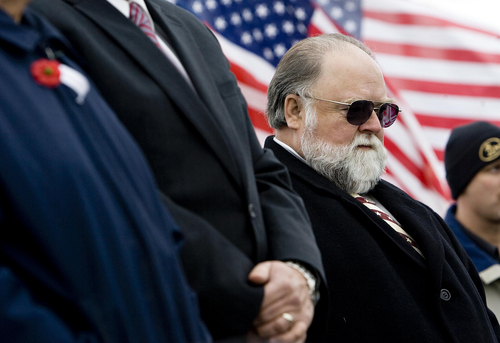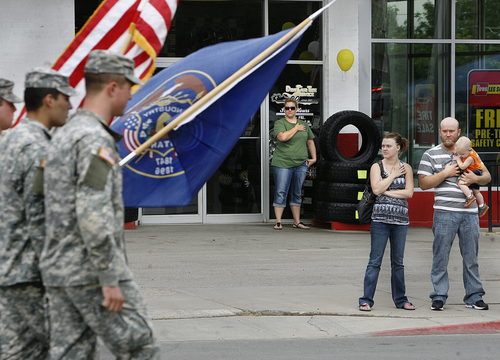This is an archived article that was published on sltrib.com in 2014, and information in the article may be outdated. It is provided only for personal research purposes and may not be reprinted.
Veda Jones spent 22 years in the Air Force. When she retired in 1980, she became active in veterans issues, first near her then-home in Clearfield.
Later she moved back near her childhood home among the rocky gray and brown plateaus of central Utah. Veterans there, Jones said, have presented her with tougher challenges.
"It's a difficult thing here because they like to hide," Jones said in an interview from her home in Price. "They get out on these little farms and don't want to be bothered."
Jones is one of about 26,000 veterans living in rural Utah, and is the type of former soldier, sailor or airman whose needs will be discussed this week. The U.S. Department of Veterans Affairs Rural Health Advisory Committee meets Tuesday and Wednesday in Salt Lake City. Also on Tuesday evening, the committee will hold a public forum for veterans at the state's veterans home in Payson.
The veterans hospital in Salt Lake City serves Utah and portions of Idaho, Nevada and Wyoming. For some veterans, that can mean up to an eight-hour drive to receive the basic medical care they are guaranteed.
According to the U.S. Census Bureau, 9.4 percent of Utahns live in what the bureau defines as a rural area. Yet, the U.S. Department of Veterans Affairs says 17.5 percent of the state's veterans live in those areas.
Rural America has a disproportionately high number of veterans ages 55 to 74, many of whom served in the Vietnam War, compared to urban centers, according to a 2010 survey by the U.S. Department of Veterans Affairs.
Rural veterans also tend to be in worse health than their urban counterparts, said John Gale, a research associate at Muskie School of Public Service at the University of Southern Maine. That's partly because the rural vets are more likely to work in blue-collar jobs that take a toll on the body, and they have a tougher time obtaining medical care, especially specialized care.
As an example, Gale said veterans of the two Gulf Wars have reported muscular injuries associated with carrying the heavy packs and body armor that have become part of the combat soldier's uniform.
"The [rural doctors] may not be as familiar with that and may not be looking for it," Gale said.
Terry Schow, who retired last year from what was then called the Utah Department of Veterans Affairs and who chairs the Rural Health Advisory Committee, said services to rural veterans have improved in recent years.
U.S. Veterans Affairs have added what's called telehealth clinics in Price and Moab, as well as Elko, Nev. Veterans can go to those clinics and video conference with a doctor who can diagnose ailments and provide treatments. There's also a program where veterans can receive diagnostic equipment in their home, attach it to a computer and upload information like blood pressure and blood-sugar levels to doctors who can monitor the veteran.
"People can live close to a V.A. medical center," Schow said. "Some choose not to. But you still have to offer services."
Gale said the medical needs of veterans and non-veterans tend to become more similar as they grow older. Rather than build veterans nursing homes in small, isolated towns, policy makers might consider programs that provide geriatric and nursing care to the broader population.
"I don't know if the answer is a long-term care facility [for veterans] or really looking at alternatives like home support," Gale said.
Mario DiCaro, a 77-year-old Korean War veteran who was commander of American Legion Price Post No. 3 for 31 years, said some rural veterans just seem disinclined to pursue benefits to which they are entitled. DiCaro said a few years ago, Veterans Affairs had what it calls a "stand down" at Utah State University Eastern. Such events are designed to encourage veterans to register for benefits. But only a few people showed, DiCaro said.
DiCaro said he tried for years to persuade a neighbor to seek benefits. The neighbor was a paratrooper shot up by a North Korean machine gun.
"Finally, he told me, 'Quit bothering me,' " DiCaro said.
Twitter: @natecarlisle —
Veterans have their say
A public forum for rural veterans will be 6 to 7:30 p.m. Tuesday at the veterans home in Payson, 1865 N. Main St. —
Drivers wanted
Disabled American Veterans is looking qualified volunteers in Carbon and Emery counties to drive its van. Anyone interested should call Patrick Keller at the Salt Lake City veterans hospital at 800-613-4012, extension 2003.









